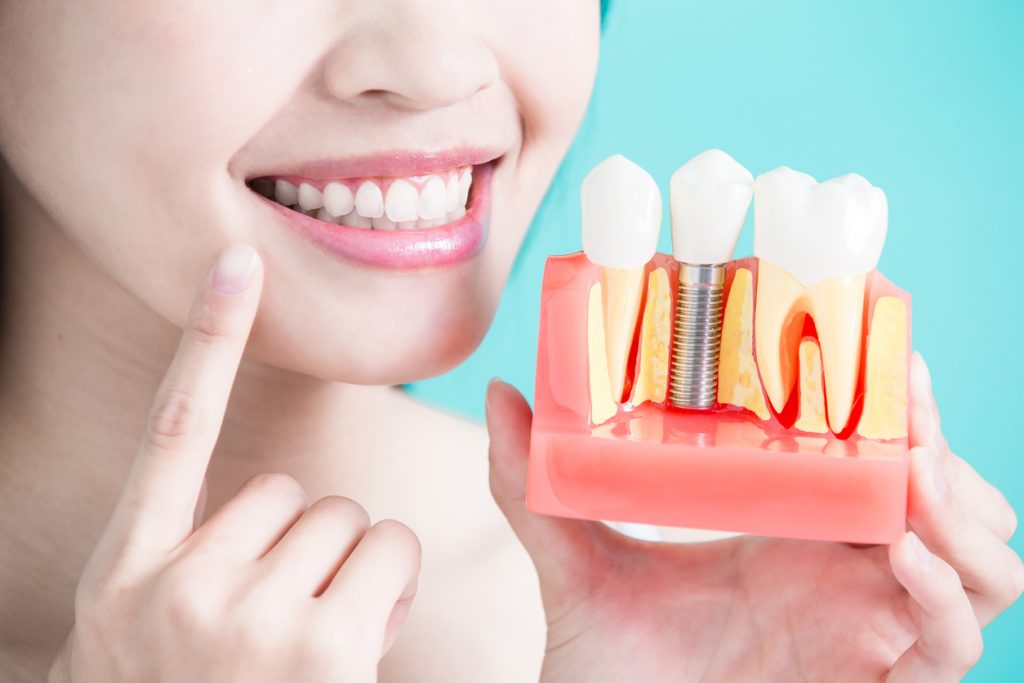If you have suffered the loss of one or more teeth, a dental implant is the most natural way to replace them. Unlike a bridge, which attaches to surrounding teeth and fills the gap, or a crown, which replaces only the top part of the tooth, a dental implant replaces the entire structure of the tooth, right down to the root. It looks, feels, and functions just like the tooth that was there before.
Like with any procedure, you have the best chance of a positive outcome with your dental implant if you use a doctor you trust and who has a strong track record. Dr. Ariel Trujillo at Arizona Periodontal Group in Phoenix focuses on dental implants and has a very high satisfaction rate among patients.
Benefits of Dental Implants
You might be wondering if it is worth it to go for a dental implant over a dental bridge. At Arizona Periodontal Group, we believe that for most patients looking for a long-term solution, a dental implant is the best way to go.
The following are the biggest benefits of dental implants:
They Look, Feel and Function Like Real Teeth
A bridge offers an aesthetic fix to a gap in your smile, at least from a distance. But if you look closely, it becomes more obvious that you have dental work. Bridges and crowns also feel different from natural teeth. If you run your finger along the surface of your teeth from left to right, you’ll be able to feel where your natural teeth end and the bridge begins. When it comes to function, bridges and crowns are serviceable, but they don’t replicate natural teeth. They’re more prone to breakage from stress, such as with aggressive chewing.
A dental implant, on the other hand, looks, feels, and functions like a real tooth. It offers full chewing power and, once you have fully healed from the procedure, feels just like the tooth that was there before. You shouldn’t even be able to tell it’s in your mouth, and other people certainly won’t notice it.
They Have a 98 Percent Success Rate
Dental implant surgery has a 98 percent success rate, which is substantially higher than most other replacement surgeries, such as knees and hips.
You can raise your chances of a successful dental implant procedure even higher by following your periodontist’s instructions to the letter, both pre and post-operatively. Many failures that are part of that 2 percent result not from surgical errors or faulty implants but from patient noncompliance.
They Are Long Lasting
The lifespan of a bridge or crown can vary based on the integrity of the material used and the skill of the doctor putting it in. But you should never expect one to last for the rest of your life.
Dental implants, on the other hand, since they replicate actual teeth, are designed to last a very long time, often for life. The titanium material of which they are composed is highly durable and anti-corrosive.
They Keep Other Teeth From Shifting
If you have a gap because of one or more missing teeth, the surrounding teeth will try to shift into that space, which will open up additional gaps between your remaining teeth. Once this happens, substantial work is required to fix the issue and restore your teeth to their rightful spots.
The best way to prevent teeth-shifting from happening, to begin with, is to have a dental implant put in as soon as possible after losing a tooth. Because it is the structural equivalent of a natural tooth, it will keep neighboring teeth from encroaching.
They Help Prevent Gum Disease, Bone Loss, and Premature Aging
A missing tooth can lead to a host of subsequent problems, including gum disease, bone loss, and even facial aging. Dental implants prevent these issues from occurring.
When you lose a tooth, the underlying bone stops receiving the stimulation that the tooth provided, and it begins to atrophy and erode as a result. An implant behaves like a normal tooth all the way down to the root, meaning it engages with the bone in the same way. Therefore, it stops bone loss from occurring.
A missing tooth can also increase your chances of gum disease. This is because food and other debris become trapped in the exposed gum pocket, where it can rot, attracting bacteria. An implant fills the gum pocket like a normal tooth, preserving the health of your gums.
Finally, bone loss from a missing tooth can cause your jawline to sag, resulting in a weaker chin and an older-looking face. By stopping bone loss, a dental implant can help stop this type of facial aging.
How to Care for Your Dental Implant

It is critical to take proper care of your dental implant, especially during the days and weeks immediately following your procedure. By doing the following, you can maximize the chance of a successful outcome:
Clean It At Least Twice Per Day
When it comes to cleaning the area around your implant, do exactly what your doctor says. Typically, that means rinsing it with warm salt water several times per day, starting the day after your implant. When your doctor gives you the green light, you can begin cleaning it two to three times each day with a Q-tip and cleaning solution. Finally, when your implant is healed, you can brush and floss it normally.
Stick to Soft Foods at First
Once your implant is healed, one of its greatest benefits is that it can withstand the same chewing and biting pressure as a normal tooth. But don’t rush the process. Stick to soft foods until your doctor says otherwise. And, please, no smoking or smokeless tobacco!
Get Regular Check-Ups
It is just as important, if not more, to have your implant examined regularly as it is for your regular teeth. Though problems are rare with patients who use high-quality periodontists and follow pre and post-operative instructions, they do happen from time to time, and the chance of an easy resolution is higher if you catch them early.
Why Dental Implants Fail
Dental implants fail only 2 percent of the time or less, but when it happens, it is usually for one of two reasons:
Excess Trauma
Before a dental implant has fully healed, it cannot withstand the trauma of hard biting or chewing. Therefore, even when your doctor clears you to begin eating normal foods again, you should try to avoid chewing on that side until you know you are fully healed, and definitely don’t use the implant to bite into hard food such as an apple.
Insufficient Oral Hygiene
Another cause of implant failure is poor hygiene. You can avoid this simply by practicing good dental habits and doing exactly what your doctor says.
To learn more about the benefits of a dental implant, schedule a consultation with Arizona Periodontal Group today!





